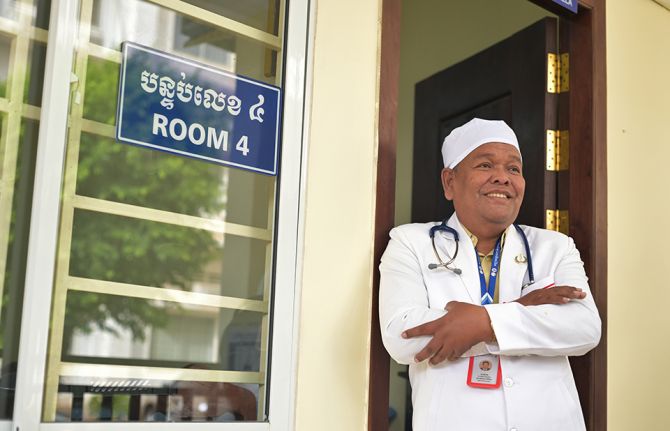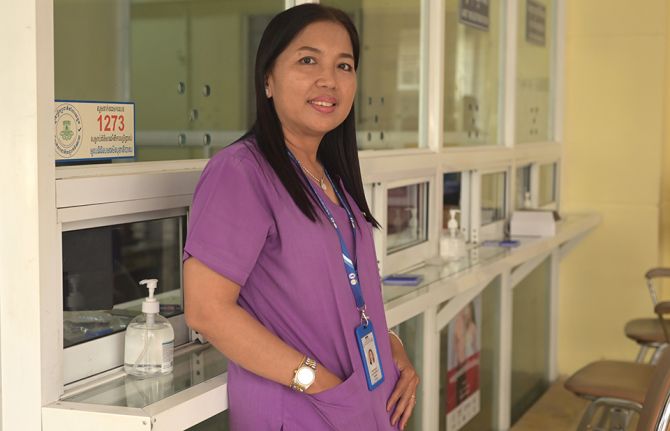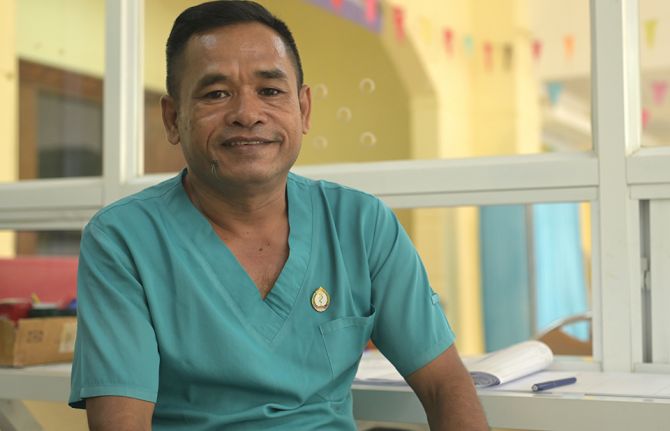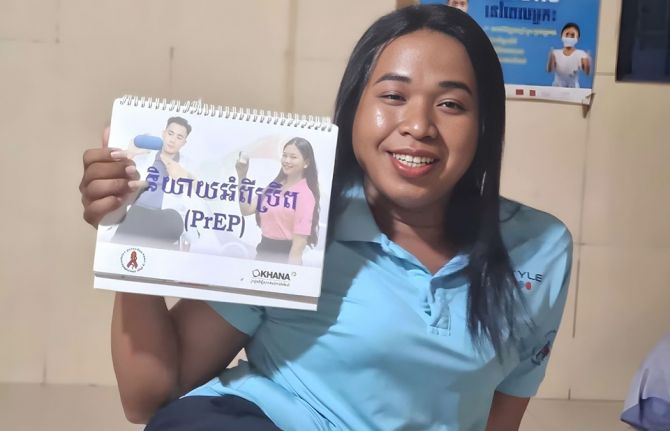




Feature Story
Client-centered services speed up Cambodia’s progress to end AIDS
20 May 2025
20 May 2025 20 May 2025Arun Seang* works six days a week in a garment factory in Phnom Penh. In the past when he needed time off to go to the HIV clinic he came up with excuses. Now there’s no need. The National Clinic for AIDS, Dermatology and STDs (NCHADS) is open every day, including weekends.
The scheduling suggestion came from a community-led monitoring exercise and community feedback. It was initially implemented as part of an Australia-supported project managed by UNAIDS. When the experiment ended, the clinic maintained a seven-day week due to its popularity.
This is one of several approaches taken to make HIV prevention and treatment services in Cambodia more user-friendly. “The staff are really nice,” Mr Seang said following his Sunday afternoon treatment consultation. “They are welcoming and also, they maintain confidentiality. I feel very safe coming here.”
Integrated community support
Cultivating a sense of trust in the delivery of HIV care has been key to Cambodia’s progress toward ending AIDS. The country is one of the front-runners to reach the 95-95-95 global targets. Currently 92% of people living with HIV are aware of their status. Almost all diagnosed people are on HIV treatment and more than 98% of those on treatment have a suppressed viral load.
These results were unimaginable when Sovann Reatrey learned she was HIV-positive, 26 years ago. “In the early days it was completely different,” she said. “Before there was a lot of stigma and discrimination. Many healthcare providers gossiped about people in the clinic and kept their distance. Now there is a welcoming environment, good communication and close physical interaction.”
At NCHADS she helps achieve this. As an Antiretroviral Users Association (AUA) counsellor her work is fully integrated into the clinic’s operations rather than an add-on. Mrs Reatrey consults with patients when they are first diagnosed and throughout their treatment journey.
“It starts as a friendly discussion. I disclose my status and tell them ‘I am also living with HIV’. Some don’t believe me. They say, ‘you look very healthy, but you are like me?’ I reassure them that it’s true. This builds trust and a relationship so they can discuss their concerns openly,” she explained. “The interaction is not as client and healthcare provider, but rather as a friend and neighbour.”
Nhem Salat, another community worker, enrolls people for HIV treatment. “I smile and encourage them to raise any issues they have when they go to see the doctor,” said Mrs Salat. “It’s all about making them feel comfortable.”
One-stop services
The waiting room isn’t hemmed in by walls. Sunlight and breeze rush through. Rows of colorful flags hang from the ceiling. The space is decidedly—perhaps deliberately—open and bright.
Huge posters invoke celebrity and safety. Singer Nicky Nicky, influencers Yaro and Sinora Roath and drag queen performer Rebecca Chan promote HIV prevention and options including condoms, PrEP (medicine to prevent HIV) and self-testing.
In addition to its standard PrEP service, this month the clinic adds long-acting cabotegravir (CAB-LA), an injectable HIV prevention option that lasts for two months, and the Dapivirine Ring (DVR), a vaginal ring which slowly releases antiretroviral medicine to prevent HIV infection.
Multiple posters invite clients to get tested. Sexually transmitted infection screenings and treatments are available. Non-communicable disease services are provided. Mental health screenings are offered to everyone. Next on NCHADS’s to-do list: more work to make the service offering youth-friendly.
By design, the space is everything for everyone.
“This clinic is a one-stop shop so people can access whatever services they need. People living with HIV don’t want to move around to different places to get healthcare,” explained the clinic’s Deputy Manager, Dr Nhem Chantha.
In his examining room, Dr Chantha, explained to Mr Seang that his viral load will be checked annually. “The U=U (undetectable equals untransmittable) message has been integrated into counseling to all clients. We have a Telegram group, and we also share information on social media platforms. This makes the clients understand the benefit of having an undetectable viral load by taking their treatment so they cannot transmit HIV. Because of this, they are very happy and really adhere to the treatment.”
UNAIDS Country Director for Cambodia, Lao PDR and Malaysia, Patricia Ongpin, noted that the emphasis on community-led care and service integration ensures impact and sustainability. “Partners in government and community are working together to find solutions that get the most out of every interaction and investment,” she said. “When services are friendly and convenient, people will use them. Then we will further reduce new HIV infections and deaths.”
*(name changed to protect privacy)



